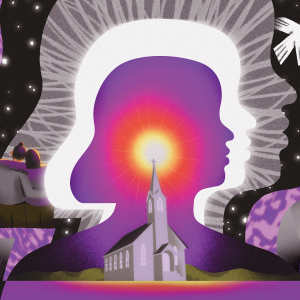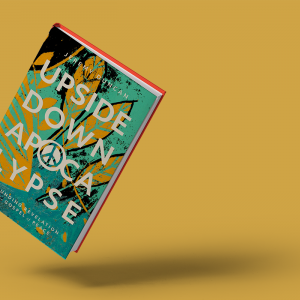
Joey Thurmond is a writer specializing in Christian sexual ethics, pop culture, and faith. He was born and raised in North Carolina and holds the Appalachian town of Boone close to his heart. He has a bachelor’s degree in communication and a master’s degree in English, respectively from High Point University and Gardner–Webb University.
While he has dabbled in academia as an English teacher and tutor, he has primarily been an online writer and editor for nearly a decade with a vested interest in the creatives, development, and design of videogames. His work can be found at Push Square, Tech Raptor, Game Informer, Love Thy Nerd, and Common Sense Media.
Joey believes that such art has much to teach us about humanity, often being the greatest means through which we absorb life-changing beauty, vulnerability, and truth. He not only thinks art reveals the image of God in us as creators, but also brings us closer to God, each other, and God’s good creation. Joey also has a blossoming interest in how Christian faith informs our understandings and practice of romance, sexual orientation, and gender identity.
He enjoys listening to indie folk and chillhop. Creative writing, reading, and gaming often take up his spare time, which are made even more fulfilling on rainy days with a black coffee in hand. He also loves dragons way more than you do. You can find him at saveasdoc.com or as @saveasdoc on Twitter.
Posts By This Author
Is ‘No Sex’ Okay?
Not desiring sex isn’t a failing or a flaw – it opens a window of possibilities.
GROWING UP, I didn’t understand why boys obsessed over girls. “Oh, you will when you’re older,” my dad kept telling me into my early 20s. Only then did I confront what I should’ve known long ago: I’m gay — but not just gay. I am romantically, but not sexually, attracted to men. My father promised that (hetero)sexual desire came with manhood, so am I less of a man?
Many conservative Christian marital counselors and sex manualists have implied that the answer is “yes.” John Eldredge, author of Wild at Heart, wrote that men “come alive” when they have a “a beauty to rescue.” In The Act of Marriage, Tim and Beverly LaHaye wrote that men’s “need for romantic love is either nonexistent or minimal.” Willard F. Harley Jr., in His Needs, Her Needs, wrote that sex is the “first thing [men] can’t do without.” Stephen Arterburn and Fred Stoeker, in Every Man’s Battle, wrote that “maleness” is heterosexual desire. Their message is clear: Sex is essential to God’s vision for manhood.
But every person can live a full, godly life without sex and romance, whether one has desires for both, either, or neither. For many asexual believers, both secular and so-called Christian understandings of sexuality have been insufficient and harmful to them — and to everyone. Perhaps understanding asexuality can lead Christians toward a more inclusive, beautiful, and faithful set of sexual ethics.
Derek Webb On Following Jesus Into a Wig and Dress
Musician Derek Webb, who started out with the band Caedmon’s Call in the 1990s, has “spent a career gnawing on the hand that feeds me in the evangelical Christian world,” he told Sojourners. From his time in Caedmon’s Call to his work as a solo artist for the past 20 years, Webb has outlined a winding and vulnerable journey of doubt, love, grief, and freedom. Most recently, Webb has been reckoning with his evangelical past, writing what he calls his “first Christian and Gospel album in a decade.”
‘Biblical Manhood’ Isn’t What Most Men Think It Is
‘Non-Toxic Masculinity’ counters purity culture – and redefines what makes a “real man.”
ENDORSEMENTS RARELY CATCH my eye, but some names that grace Zachary Wagner’s Non-Toxic Masculinity: Recovering Healthy Male Sexuality made my jaw drop. Amy Peeler and Kristin Kobes Du Mez — scholars renowned for tackling purity culture and male-centric theology — aren’t names you’d expect on a book like this. Most traditional Christian men’s thoughts on “biblical manhood” are not only flimsily dressed in culturally secular activities like playin’ sports and shootin’ guns, but also fatally based in unbiblical standards of hypersexual and violent behavior. Thankfully, Wagner swings over such pitfalls, laying out an expansive vision of masculinity rooted in the Jesus ideal: love for God and neighbor.
Wagner articulates how purity culture failed both women and men. “Many of the theological and cultural foundations of the movement were sub-Christian, even worldly,” he writes. “Dehumanizing theology leads to dehumanizing behavior” — behavior that includes fetishized virginity, body hatred, tolerated abuse, and sexual segregation. Purity culture, Wagner explains, calls men “animals” and “perverts,” confounding rhetoric I heard growing up in the church. This type of gendered, sexual denigration — especially when attributed, in part, to God’s design — only serves to further dishonor the imago dei of men and excuse sexual sin.
There’s a “pathetically low and impossibly high bar for masculine sexuality [that] trains men to resist, flee, and medicate (through marital sex) their untamable boyish immaturity rather than grow beyond it,” Wagner writes. The divinization of high libidos and heterosexual marriage can be doubly damaging for queer Christian men, who face additional stigmatization and erasure in the church.
Friendships Fall Apart in ‘Banshees of Inisherin’
The Banshees of Inisherin has received several awards from the Golden Globes and multiple nominations for the forthcoming Academy Awards. It’s not hard to see why: Martin McDonagh’s film captures the complex, deep turmoil of a friendship falling apart. The friendship falls apart because the characters don’t have the framework to work through misunderstandings due to their depressive state.
Believe It or Not, the Book of Revelation Embodies Nonviolence
Jeremy Duncan invites readers to remember that the Jesus of Revelation is the Jesus of the gospels: A king of kings and a Prince of Peace.
REVELATION IS AN intimidating book of the Bible to understand, let alone apply to everyday life. Dense with symbolic imagery and metaphors, it has been subject to innumerable interpretations and far-flung theories. But what are we to make of startling moments in the text, like when Jesus regurgitates a sword or John eats a scroll? In Upside-Down Apocalypse: Grounding Revelation in the Gospel of Peace, author Jeremy Duncan walks readers through Revelation by drawing parallels between the genres and figures of speech of John’s day and ours, lending clarity to how John’s apocalypse is deeply steeped in Jewish literary tradition and Roman culture. When we ignore this context, we miss the point of the final book of the New Testament: Revelation is not the wrathful reckoning of a conquering king; rather, as Duncan writes, it’s a testament to “how the Prince of Peace turns violence on its head once and for all.”
With each chapter, Duncan decenters “chrono-centric” approaches to Revelation, encouraging readers to avoid reading the text as “a story about me and my world and my time exclusively.” As the perfect, timeless witness of God, Jesus must be the guiding principle by which we understand all of scripture. Only then can we appreciate how God’s kingdom in Revelation contrasts with earthly kingdoms fueled by oppression. “[E]very time you awaken to how empire is trying to steal your imagination and make you believe in violence,” Duncan writes, “you have rightly interpreted Revelation regardless of the time period in which you awake.” Revelation asks us to watch for injustice, wherever and whenever it appears.




